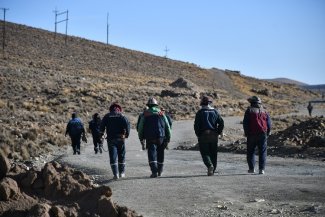A Bulgarian woman takes a look at her UK visa as she walks out of the British embassy in Sofia, Bulgaria. Fears of the mass arrival of Romanians and Bulgarians to the UK following visa liberalisation in January 2014 were unfounded.
On 1 January 2014, Bulgarians and Romanians gained the same rights to work in the UK as other citizens of the European Union, seven years after they joined the EU.
The British press predicted a “deluge” of tens of thousands eastern European migrants coming to the UK in a desperate search for jobs.
Meanwhile, politicians such as Nigel Farage of the UK Independence Party used the imagined threat of hoards of unemployed Romanians and Bulgarians coming to Britain to claim benefits as an excuse to further their eurosceptic political agendas.
Appearing on the BBC TV show Question Time, Farage warned viewers that “it is completely irresponsible, wrong, in fact damn stupid, to be opening our doors next January to 29 million people from Bulgaria and Romania.”
But what happened on 1 January couldn’t have been further from the truth.
The most recent statistics reveal that the number of Bulgarians and Romanians employed in the UK between January and March of this year was down 4,000 from 140,000 for the final three months of 2013.
And this drop in migration has not only affected workers but also students.
Earlier this year, the British government was sued by Bulgarians and Romanians studying in the UK over its decision to suddenly cut off support to thousands of these foreign students.
According to figures from the Association of Private Universities in Bulgaria, 80,000 students went abroad to study in 2011, many of them to the UK.
But the recent climate of hostility has only served to put off potential and current students from studying there.
“In Bulgaria there’s still a persistent stereotype that you have to go somewhere abroad because life is better,” says Nelly Kirilova, a 25-year-old student who is currently studying in Glasgow.
But after several years studying in the UK, Nelly has decided to return to Bulgaria after graduation.
She told Equal Times that while there are “many opportunities” for foreigners, “the challenge is to discover them, and to have the right information and qualifications.”
Back to home
According to the Bulgarian National Statistical Institute, the number of the Bulgarians who decide to return from abroad has been steadily increasing in the last years.
In 2006, 4.4 per cent of Bulgarian immigrants returned to the country; by 2014 that percentage was up to 11.1 per cent.
But the country still suffers a massive “brain drain”.
In 2013, Podkrepa, the Bulgarian Confederation of Labour, estimated that between 20,000 and 25,000 young Bulgarians leave the country annually in search of work, out of a population of almost seven million people.
According to Elena Rapondzhieva, a 24-year-old former student in the UK, the idea that her people from her country are desperate to come to the UK is more rooted in myth than reality.
“Many people who wanted to go to the UK had the opportunity to do it before the visa regime ended,” she says.
Yes, she says many Bulgarians are leaving the country in search of better opportunities but not everyone is looking towards the British Isles.
“I think that the UK is just another country where Bulgarians have a full access to the labour market now.”
Elena recently returned to Bulgaria because she found it hard to find work in the UK.
“There was no open discrimination towards foreigners but an employer would always prefer to hire a local. And when you enter an industry, there are already many local people who are as good as you are,” she says.
Now, young Bulgarians are taking the initiative to reverse the brain drain and help provide opportunities for their fellow countrymen and women who want to return home.
Temenuzhka Spirova, 25, is a project manager for Back2BG, a website that provides information on vacancies and the administrative procedures related to working in Bulgaria.
“Our main goal is to assist people who have either decided or are thinking about return to Bulgaria for work”, says Spirova.
According to Spirova the reasons for the Bulgarian to return are possibly mainly emotional and related to their families or to nostalgia.
She also thinks that there are opportunities here for the people who think innovatively and want to create new business models, to implement their ideas.
Not the least, the Bulgarian employers have grown to appreciate the experience and education gained abroad.
Spirova has said the website has been contacted by a growing number of people declaring their intention to return home.
For example, at the forum Career in Bulgaria 2013 48 per cent of the participants said they already have returned in Bulgaria, 24 per cent said with no hesitation that they would return, 27 per cent hesitated and only one per cent said they undoubtedly did not plan any return.
But even for those who do, coming back home isn’t easy.
“I left Britain because after four years and a half I got tired of sharing accommodation with five more people and persuading people that I’m not ‘eastern European trash,’” says Elena.
“I know many people who have come home and are still searching for work. But I don’t regret my decision.”










